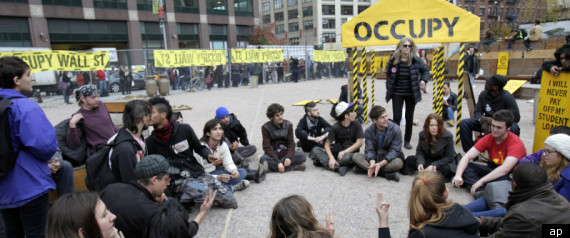Efforts to amend the Constitution to declare that corporations are not people and money is not speech gained support in two notable New York forums this week. The New York City General Assembly of the Occupy Wall Street movement on Tuesday officially called for a constitutional amendment to overturn a controversial Supreme Court decision from 2010 . On Wednesday, a similar resolution passed the New York City Council.
Such an amendment would reverse not only the Supreme Court's 2010 opinion in Citizens United v. Federal Election Commission, which held that corporations have the constitutional right to spend unlimited sums of money to influence elections, but also its seminal 1976 decision in Buckley v. Valeo, which first established that money constituted speech for First Amendment purposes.
Beyond New York, the Los Angeles City Council almost a month ago and several other city governments across the nation have supported anti-Citizens United resolutions. MSNBC's Dylan Ratigan has launched a petition calling for an amendment that has pulled in nearly 300,000 signatures, and members of Congress have proposed various joint resolutions in the House and Senate to start the process from Washington.
The OWS NYC resolution states, "Be it resolved that the New York City General Assembly of Occupy Wall Street joins the millions of citizens, grassroots organizations and local governments across the country in calling for an Amendment to the Constitution to firmly establish that money is not speech, that human beings, not corporations, are persons entitled to constitutional rights, and that the rights of human beings will never again be granted to fictitious entities or property."
On Dec. 30, the Montana Supreme Court added its authority to the Citizens United backlash by upholding the state's century-old ban on corporate cash in campaigns. The majority decision, written by Chief Justice Mike McGrath, described Montana's own history of corporate control over state government as sufficient justification for the ban's constitutionality. This fact-bound determination defied the U.S. Supreme Court's conclusion that independent electoral spending can never give rise to corruption or the appearance of corruption.
The U.S. Supreme Court is expected to reverse its Montana counterpart -- and any other court that chooses to follow Montana's lead. Unless and until the U.S. Supreme Court's composition changes in favor of those challenging Citizens United, the amendment process now gaining momentum remains a better option than litigation for those who want corporate money out of politics.
Original Article
Source: Huff
Such an amendment would reverse not only the Supreme Court's 2010 opinion in Citizens United v. Federal Election Commission, which held that corporations have the constitutional right to spend unlimited sums of money to influence elections, but also its seminal 1976 decision in Buckley v. Valeo, which first established that money constituted speech for First Amendment purposes.
Beyond New York, the Los Angeles City Council almost a month ago and several other city governments across the nation have supported anti-Citizens United resolutions. MSNBC's Dylan Ratigan has launched a petition calling for an amendment that has pulled in nearly 300,000 signatures, and members of Congress have proposed various joint resolutions in the House and Senate to start the process from Washington.
The OWS NYC resolution states, "Be it resolved that the New York City General Assembly of Occupy Wall Street joins the millions of citizens, grassroots organizations and local governments across the country in calling for an Amendment to the Constitution to firmly establish that money is not speech, that human beings, not corporations, are persons entitled to constitutional rights, and that the rights of human beings will never again be granted to fictitious entities or property."
On Dec. 30, the Montana Supreme Court added its authority to the Citizens United backlash by upholding the state's century-old ban on corporate cash in campaigns. The majority decision, written by Chief Justice Mike McGrath, described Montana's own history of corporate control over state government as sufficient justification for the ban's constitutionality. This fact-bound determination defied the U.S. Supreme Court's conclusion that independent electoral spending can never give rise to corruption or the appearance of corruption.
The U.S. Supreme Court is expected to reverse its Montana counterpart -- and any other court that chooses to follow Montana's lead. Unless and until the U.S. Supreme Court's composition changes in favor of those challenging Citizens United, the amendment process now gaining momentum remains a better option than litigation for those who want corporate money out of politics.
Original Article
Source: Huff

No comments:
Post a Comment